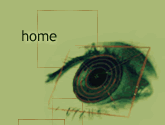|
Michael
:
When I was at your place six or seven years ago, you showed me a
device that helped you read. It was a small video camera that you
could lay on top of a printed page, and the words would show up
much bigger on your computer screen. When I was there more recently,
your computer was talking to you out loud, reading the text of an
article you were writing--albeit in a monotonous, staccato voice.
I assume the shift in technologies reflects both your changing needs
and the evolving state of the art of reading aids.
|
|
Joel
:
The device you remember was a closed circuit TV reading system
(CCTV). Some CCTV's use your computer's screen for display,
but most have their own monitors, mounted above a movable reading
table on which the camera lens is focused. This is the type
I have now. I use it mostly for examining bills, reading snail
mail, and CD liner notes. At first, I used a CCTV to read entire
books, but now the glare (unnoticeable to normal eyes) and the
extreme magnification needed to keep print from looking as if
it's been chewed up by insects makes this impossible. The talking
computer trick is done with a text-to-speech system, a screen
reader. Mine is called Jaws for Windows, from the Henter-Joyce
|
|

Joel on using CCTV.
|
|
|
Company. Jaws lets me perform all computer tasks, including
e-mail and Web surfing. The technology emerged in the days of
the text-based DOS operating system. Later, developers had to
scramble to adapt the concept to the graphical interface of
a Windows or MAC display, find menu alternatives to the icons
and keyboard equivalents to mouse commands. Despite the robot-like
synthesized voice and, more importantly, the profound adjustments
required for reading and especially for writing by ear, I love
this thing, and can't imagine life without it.
|
|
|
Michael
:
Can you say a bit about your difficulties adjusting to the screen
reader? I'm so accustomed to hearing my own little inner voice when
I read; I get impatient even with a good actor reading, say, a short
story on the radio. It must be tough hearing that machine voice
droning away at you for long stretches.
|
|

Joel
using his
screen reader
|
|
Joel
:
I've accustomed myself to the synthetic voice, despite the undeniable
annoyance. Still, listening to its unreal, grating diction and
timbre all day is stressful and ultimately exhausting. At the
philosophical level, I'm okay with it. After all, I need it.
But listening to the voice hour after hour simply wears me down.
I take a lot of breaks to get away from it, in the midst of
working. Play guitar. Cook a pot of black beans for lunch. Fold
laundry. Listen to NPR or talking books. The real problem, ultimately,
is the way working by ear distorts the mental processes of reading
and writing.
|
|
|
|
|








